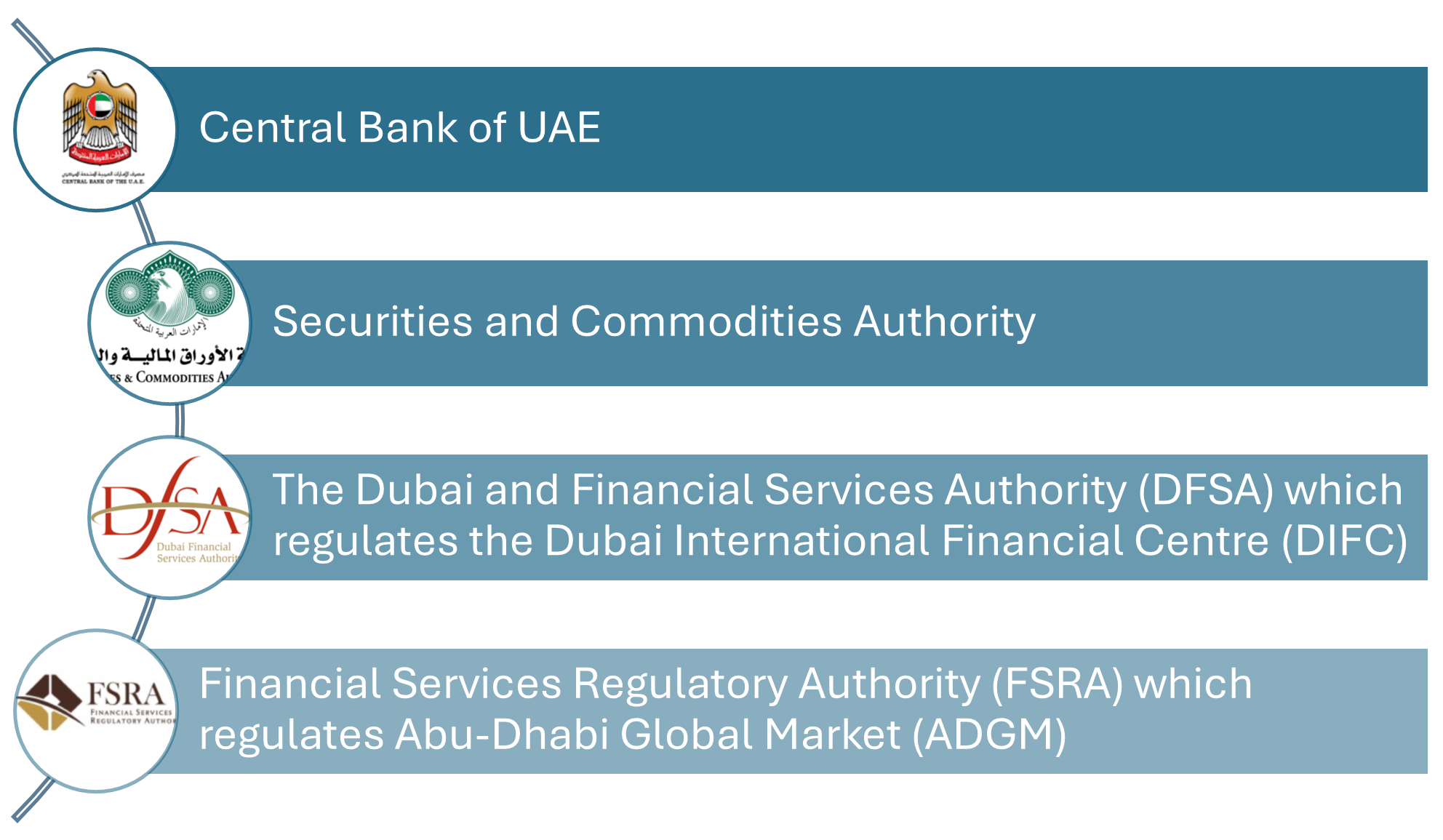Introduction
UAE banks aren’t just financial institutions, they’re the pillars of the nation’s economic growth, driving everything from innovation to global investment. The question that keeps rolling in mind is how the banking sector is operated at the macro level and what are the regulatory authorities that monitor the financial activities in the economy.
Banking Sector is considered to be the leading branch of the global financial industry. Within the Middle East Region, UAE’s banking sector being the prominent one having worth over 813 billion U.S. Dollars has crossed Saudi Arabia’s banking sector. United Arab Emirates being the financial hub owing to the establishment and promotion of Free Zones has made it mandated to create a robust financial stability through laws and regulations in the country. Hence, Banking and Financial Laws of UAE are significant in creating transparency, financial stability and key contributors for economic growth of the country. This article will shed light on legal framework of Banking and Financial Laws of UAE giving insights to provisions that play a vital role for promoting financial and banking industry.
Regulatory Authorities for Banking Sector of UAE
Following are distinct regulators who have the authority to govern and supervise banks, financial institutions and insurers:

- Dubai International Financial Centre (DIFC)
DIFC is the world’s leading financial hub which operates as a free zone providing a modern regulatory framework for companies and financial institutions who are involved in financial activities. It has its separate laws which are distinct from that of UAE Federal Laws. This implies that it has its own legal system which is based on English Common Law and is different from UAE’s civil law system. It is aligned with international standards and practices which is favourable for banks and businesses that are incorporated in DIFC.
Banks and financial institutions operating in DIFC free zone have to obtain license from Dubai Financial Services Authority (DFSA). Having a separate legal system that it has its own set of rules and regulations for governing the banking sector and financial institutions which attain several benefits due to operating in special economic zone. - Abu Dhabi Global Market (ADGM)
It is also a financial hub similar to the DIFC located in Abu Dhabi. Abu Dhabi Global Market similarly like above has its own legal system and independent laws from UAE Federal Laws. Financial Services Regulatory Authority is the statutory body which is responsible for governing and enforcing laws framed for the development and progress of entities incorporated in ADGM. The Financial Services and Market Regulations 2015 are enacted and enforced to foster confidence and safety of Abu Dhabi Global Market.
FSRA require financial entities to submit information on regular basis that involves the regulatory and financial reports to understand the financial status of an entity in a regular interval of time. Electronic Prudential reporting System is a portal which is designed to simplify the submission of filings necessary for statutory requirements. Also, there are number of rules and regulations that are enforced in the ADGM in order for efficient working of banking and financial sector in the free zone of Abu Dhabi. Following are the names of regulations which are framed for banks and financial institutions in Abu Dhabi Global Market:- Bank Recovery and Resolution Regulations 2018
- Common Reporting Standard Regulations 2017
- Financial Services and Markets Regulations 2015
- Foreign Account Tax Compliance Regulations 2022 Moreover, there are numerous rules enacted for supervision of banks and other entities established in free zone in order to attract foreign investments and to streamline the international standards for banking and financial institutions to promote the UAE’s economy.
Regulatory Framework for Banking Operations in the UAE
-
Federal Decree-Law No.14/2018 Regarding the Central Bank and Financial Institutions Organization and Activities
This law has established that the UAE Central Bank is the primary regulatory authority to act as supervisory, monitoring and regulating body for financial institutions and other banks operating in the UAE. Central Bank UAE (CBUAE) derives authority from this law to issue regulations, directives enforceable against financial institutions including commercial banks, investment banks, insurance companies and money exchange businesses. CBUE works for the promotion of monetary and financial stability and also deliver protection to consumers in order to enhance economic growth for the benefit of people sustaining in the country. Following are the significant roles and responsibilities performed by CBUAE:
- It is one of the top central banks at the global level standing at competitive edge supporting UAE’s economy.
- Create and execute monetary policy.
- Make use of power to Issue Currency.
- Determine the requirements to establish Financial Institutions and make stringent laws to align with international norms and standards and also organize financial activities by laying groundwork for their perpetual existence.
- Keep an eye on the state’s credit situation for giving assistance to the country’s economy to have a balanced growth.
- In accordance with the Decretal Law, it manages the Foreign Reserves to ensure the all-time availability of foreign currency to cover the monetary base.
- Regulate Insurance Sector by proposing laws and implementing the same for the insurance business.
- Netting Law of UAE
Netting in UAE is referred to as a mechanism in which financial obligations of the parties involved are offset and resulting into single payment. This process of netting mechanism in UAE reduces the risk of credit and settlement which is significantly recognized as Federal Decree Law No. 31 of 2024 and is made effective from 2nd January 2025. The UAE Netting Law is created subject to the International Swaps and Derivatives Association’s (ISDA) 2018 Model Netting Act. Free Zones in UAE have their own legislations which are not affected by Netting Law of UAE.
Parties may enter into agreements under this law in order to netting off their payments and delivery obligations under the qualified financial contracts. Qualified Financial Contracts that either creates a right to retain an obligation or for making payments in order to transfer assets which involves the following:- All Types of Swaps (regarding currencies, commodities, interest rates or basis rates)
- Currency or Interest rate futures
- Forward Rate Agreements
- Interest Rate Options
- Derivatives
- Collateral Agreements
- Securities Contracts
- Voluntary Carbon Credit Derivatives
- Any Shari’ah compliant arrangement
- Anti Money Laundering Law of UAE
Money Laundering is considered as the illegal activity which is an offence or crime in all over the world that generates tainted money and is converted as legal money at the worldwide stage. The Financial Action Task Force is the intergovernmental body developed for fighting against this illicit practice. This inter-governmental body has developed standards for the prevention of money laundering activities and to provide the measures and actions for monitoring the activities that could lead to money laundering in banks and financial institutions. Hence, the applicability of this regulatory framework is on banks and financial institutions.
This law is regulated by Central Bank of UAE by the Banking Supervision Department to prevent the illicit activities and proceeds of crime that are engaged through banking activities. Federal Decree No. (20) of 2018 is the key legislation on Anti-Money Laundering and Financing of Terrorism. Cabinet Decision No. (10) of 2019 is the effective regulation of Anti Money Laundering Law to fight against financing of illegal organisations.
However, apart from the above legislation, there are anti-money laundering legislation which are enforced in the free zones independent from the UAE’s federal laws and aims to prevent the financial activities which are generated as proceeds from crime. Hence, AML Law in UAE plays a crucial role for the prevention of money laundering the banking and financial sector of the economy.
Conclusion
The UAE’s well-structured banking laws and the proactive role of the Central Bank create a secure and progressive environment for financial operations. By maintaining rigorous oversight and adapting to evolving global standards, the UAE continues to position itself as a leading financial hub in the region, attracting both local and international investors while promoting long-term economic resilience.
Disclaimer
The information provided in this article is intended for general informational purposes only and should not be construed as legal advice. The content of this article is not intended to create and receipt of it does not constitute any relationship. Readers should not act upon this information without seeking professional legal counsel.


